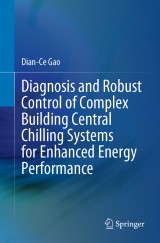Details

Diagnosis and Robust Control of Complex Building Central Chilling Systems for Enhanced Energy Performance
|
CHF 59.00 |
|
| Verlag: | Springer |
| Format: | |
| Veröffentl.: | 12.12.2019 |
| ISBN/EAN: | 9789811506987 |
| Sprache: | englisch |
Dieses eBook enthält ein Wasserzeichen.
Beschreibungen
<div>This book discusses enhancing the overall energy performance of building central air-conditioning systems through fault diagnosis and robust control strategies. Fault diagnosis strategies aim to determine the exact cause of problems and evaluate the energy impact on the system, while robust control strategies aim to manage chilled water systems to avoid the occurrence of low delta-T syndrome and deficit flow problems. Presenting the first academic study of the diagnostic method and control mechanism of “small temperature difference syndrome”, the book describes the highly robust and adaptive fault-tolerant control method developed to overcome the influences of external disturbance on the process control in practical applications. The diagnostic technology developed provides a predictive assessment of the energy dissipation effect of the fault. This book is a valuable reference resource for researchers and designers in the areas of building energy management and built environment control, as well as for senior undergraduate and graduate students.</div>
<p></p><p>Introduction.- Dynamic Simulation Platform of the Studied Building Systems.- In-situ Diagnosis of The Low Delta-T Syndrome in The Chilled Water System: A Case study.- System-level Fault Detection and Diagnosis Method for Low Delta-T Syndrome in the Complex HVAC Systems.- Online adaptive Optimal Control Strategy for the Chilled Water System involving Intermediate Heat Exchangers.- Fault-Tolerant Control Strategy for primary-secondary Chilled Water System.- Simplified Online Robust Pump Speed Control Strategy for Practical Implementation.- Model-based Evaluation of The Energy Impact of Low Delta-T Syndrome Using Support Vector Regression.</p><p></p>
<p>Diance Gao obtained his B.Eng. and M.Sc. degrees in Heating, Ventilation, and Air Conditioning (HVAC) from Chong Qing University in 1999 and 2003, respectively, and received his Ph.D. in HVAC and Building Automation from the Hong Kong Polytechnic University in 2013. He joined Sun Yat-sen University as an Associate Professor in 2017. </p><p>He is extensively involved in research and applications in areas such as building energy efficiency, optimal control and fault diagnosis of building systems, building energy management for smart grid and intelligent building technology. He has published over 20 papers in respected, refereed journals and more than 10 papers at international conferences.</p><div><br></div>
This book discusses enhancing the overall energy performance of building central air-conditioning systems through fault diagnosis and robust control strategies. Fault diagnosis strategies aim to determine the exact cause of problems and evaluate the energy impact on the system, while robust control strategies aim to manage chilled water systems to avoid the occurrence of low delta-T syndrome and deficit flow problems. Presenting the first academic study of the diagnostic method and control mechanism of “small temperature difference syndrome”, the book describes the highly robust and adaptive fault-tolerant control method developed to overcome the influences of external disturbance on the process control in practical applications. The diagnostic technology developed provides a predictive assessment of the energy dissipation effect of the fault. This book is a valuable reference resource for researchers and designers in the areas of building energy management and built environment control, as well as for senior undergraduate and graduate students.
Presents fault diagnosis and robust control strategies to enhance the overall energy performance of building central air-conditioning systems Describes an in situ diagnosis method and includes case studies to help readers to determine the exact reasons for faults and evaluate the energy impact on building systems in practical applications Proposes an online adaptive optimal control strategy and a fault-tolerant control strategy

















